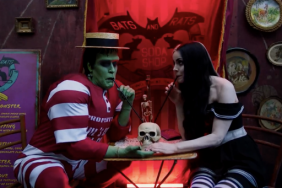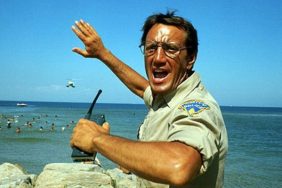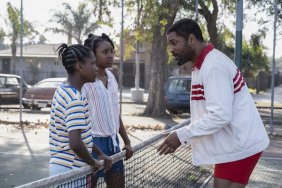They’re coming to get you, audience! And you love every single moment of it, don’t you? The zombie movies genre has been unstoppable for decades, ever since George Romero’s Night of the Living Dead redefined the genre in 1968, leading to hundreds of imitators and trailblazers that strove to use packs of shambling corpses to symbolize one issue or another, or just as meat-filled skin sacks ready to explode for the audience’s pleasure.
This weekend sees the release of one of the more serious zombie movies in quite a while – Maggie, starring Arnold Schwarzenegger as a grieving dad watching his daughter slowly wither away from infection – and that got us thinking… after more than a year of this ongoing series, how have we not done The Best Zombie Movies Ever yet? So we finally asked CraveOnline critics William Bibbiani, Witney Seibold and Brian Formo to unearth their picks for the one film that best represents the best zombie movies ever.
Best Zombie Movies List
Find out what they picked as the best zombie movies, let us know your own favorites, and come back next week for another highly debatable installment of The Best Movie Ever!
Check Out: The Best Movie Ever: Summer Blockbusters
Brian Formo’s Pick: Night of the Living Dead (1968)

Essentially repeating Professor Witney Seibold from last week’s installment of Best Movie Ever: sometimes the first experience of something really can be the best. 47 years ago, George A. Romero’s Night of the Living Dead gave us the modern film zombie. Sure there’ve been movie living dead before (for instance, I Walked With a Zombie), but never had these undead beings been filmed as lumbering packs of human bodies that attempt to break through windows, doors—any barrier—with very specific motions, and sounds.
Romero’s early low-budget film still holds up magnificently. In addition to being a nice little artifact that establishes many zombie rules for a subgenre of film and even social culture (zombie marches, zombie survival scenario games, etc.), Romero’s film is about more than terror and thrills. Released in 1968, following a string of public assassinations of prominent American figures, the film’s third act removes the glow of authority figures—here, the police—and suggest that large lumbering packs of fully-alive human bodies, given weapons and orders, also might not actually know what’s best. Or operate with the ultimate best interests. They could just be protecting themselves.
The ending is of immense power. Not just for a potentially racially charged killing by the police, but also in how the bodies from the human characters we’ve seen in the farmhouse are handled in their removal—they are pulled out by meathooks and are then taken to be burned en masse with the “proper” zombie kills. Romero’s film has images that resemble the horror of mass burials during war, the most horrible pictures from the Civil Rights movement, and a very distinct latter-60s distrust of generals, captains, and any group in charge of restoring order. Those are the very groups with power filmmakers have perhaps brainlessly always given the hero-sheen the instant that they enter the screen. By the end of Night of the Living Dead you have more sympathy for the zombies who gnaw on human limbs, than you do the authority figures who supposedly still have the power of reason.
Romero would take the brainlessness further by staging the carnage of his next zombie film, Dawn of the Dead (which had a larger budget, more gore), in a major shopping center. And after both Night of the Living Dead and Dawn of the Dead, not only had he set-up the movements of packs of zombies, but he’d also set-up the idea that braindead beings in mass congregation is a horror subgenre that most relevantly comments on society at large.
Check Out: The Best Movie Ever: Harrison Ford
Witney Seibold’s Pick: Night of the Living Dead (1968)

Despite the popularity (and persistence) of the genre, I confess that I have never been an enormous fan of zombies or of zombie movies. I think it’s because, as monsters, they offer almost nothing in the way of depth or drama. Vampires and wolf men and the like can be textured people with monstrous problems that they either embrace or reject. Zombies have no personality by necessity, often moving as an amorphous mass that creeps ever more slowly toward you. The appeal in zombie movies, then, is not in how the monsters behave, but in the way our non-zombie protagonists can dispatch them. Zombies offer the following fantasy to viewers: The ability to mutilate and murder a large group of people in the name of protection and righteousness. In a way, all zombie films represent the basest fantasies of the xenophobic. Zombies are the “other,” and it’s our job to shoot them in the head.
Zombies are so blank, in fact, that they are often crammed into political and social allegories with relative ease, and George A. Romero’s Dawn of the Dead is often cited as the best zombie film for its not-so-subtle skewering of consumer culture (zombies die, still go to the mall). Dawn is fine, but for the best zombie film, I must skew to the origin, and cite Romero’s own 1968 original Night of the Living Dead as the best. There are no two ways about this. Night of the Living Dead essential invented the monster (referred to as “ghouls” and not as zombies) as we see them today, and it sparked the entire zombie subgenre. It’s also super creepy and undeniably effective, either despite or because of its low-fi, low-budget look. Also, with a black protagonist in 1968, there is most certainly an unintended undercurrent of racial tension lurking under the film.
There have been slicker, more complex zombie films made since Night of the Living Dead, but none have been as good, as striking, as scary as this one.
Check Out: The Best Movie Ever: Gimmick Movies
William Bibbiani’s Pick: Shaun of the Dead (2004)

I feel guilty about this, but only a little. It seems rude to pass up a chance to declare Night of the Living Dead or at least the original Dawn of the Dead as “the best zombie movie ever,” since the genre wouldn’t exist – at least in its current, most popular and social relevant form – without them. But the power of the zombie movie lies in its ability to use elements of horror to explore universal issues, and no zombie movie feels more universal than Shaun of the Dead.
Edgar Wright’s film literally couldn’t exist without the many zombie films that came before it. Practically every scene includes a direct homage to the works of George Romero, or the many filmmakers he directly inspired. But that fealty actually works in Shaun of the Dead‘s favor, because Wright’s movie isn’t just about zombies, and it isn’t just about using zombies as a metaphor for growing up. It’s about the way audiences use zombie movies, and interpret them in such a way that they become useful cultural archetypes.
Shaun (Simon Pegg) is at a crossroads: technically an adult, but obviously immature. His life falls apart over the course of a day, so he makes a list of every single thing he would need to do to put it back together again, and become the sort of responsible man worthy of his newly ex-girlfriend. When the zombie apocalypse takes hold the next morning, he finds himself forced to overcome every single obstacle on his list, because now every single one of them is a matter of life and death. Getting his girlfriend back becomes synonymous with saving her life, coming to terms with his mother and stepfather involves living through their deaths, and letting go of his stunted relationship with his best friend Ed (Nick Frost) involves literally letting go, while Ed finally grows up himself by making the ultimate sacrifice.
Fans of zombie movies inhale the genre’s social criticism, but too often focus on the superficial blood and guts. Shaun of the Dead puts those audience members in a situation that demands their maturity, whilst simultaneously indulging – spectacularly – in all the superficial violence and humor that captures their attention. Shaun of the Dead is about the power of zombie movies to affect individual change, to be constructive, as opposed to cynical. It’s emotionally overwhelming and absurdly hilarious. It’s thoughtful and grotesquely violent. It’s the best zombie movie ever, even if it couldn’t possibly exist without all the others.
Don’t forget to let us know what you consider to be the best zombie movies ever in the comment section below!








